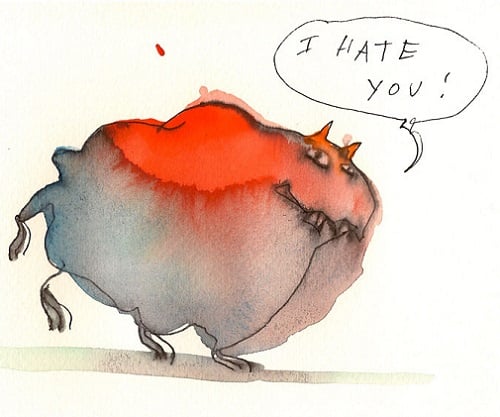When Your Child Writes Hurtful Words
Sometimes freewriting yields an emotional catharsis in your child. You find out that she is angry at her father for teasing her about her table manners. You discover that your son is mad at you for “making him do math.” You read that your child thinks your mother is mean or that another child calls her brother “stupid.”
It takes a big person to withstand criticism in almost any setting. But when it comes from a beloved child, it’s like running a tractor over your heart. Freewriting sometimes calls forth buried emotions, but it can also yield truths that you might not want to face.
For instance, maybe your mother was mean the last time she visited, or perhaps your spouse did cross the line from teasing to mocking and humiliated the daughter.
It’s important to stand up for reality in your family. So if your child detected misbehavior by an adult and it showed up in writing, validate it. You don’t need to pretend it away or minimize it. Simply acknowledge it:
- “You’re right. Grandma was pretty harsh. I don’t like it when she shouts either.”
- “Let’s talk to Dad. I wonder if he knows he hurt your feelings.”
- “Thanks for sharing this with me. Let’s see what can be done to repair the damage.”
If the freewriting is slanderous: “Joey is stupid” or “Mom is the worst mother in the world,” you can talk about it from a writing point of view.
Powerful writing “shows” it doesn’t “tell.”
Suggest your child lay off of the “slams” and focus instead on revealing the character of the one being accused. What can happen in those moments is powerful. Now your child is being required to find support for the assertion. As he or she does that, sometimes perspective has a way of creeping in. Maybe she discovers that Joey isn’t actually stupid, he just plays too hard sometimes and your daughter gets overwhelmed. Maybe your son discovers that what is bugging him is that he wants to play his computer game longer and you stop him for dinner. Now you have a real problem that can be addressed and solved, rather than name-calling.
Use this kind of writing to heal pain and damaged relationships. Honor it. Don’t judge it. Never require anyone to write only edifying depictions of others. Some of the best writing is the accurate recognition of another person’s flaws. Learning how to depict those with care is the challenge. If the writing is a veiled plea for support and love, take care of that too.
Image by waltercolor (cc cropped)



















A powerful post. Such writing, and such thoughtful response, teaches about relationships in a safe setting. Being able to reflect on those feelings at a distance will create insights that will certainly influence how the next “relationship moment” occurs.
Thank you.